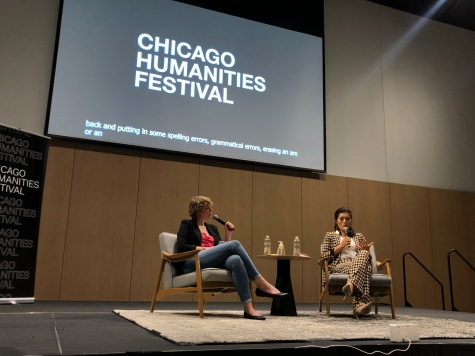Bestselling author Qian Julie Wang visits campus, shares her story as an undocumented immigrant
September 30, 2021

“I was born in America. I’ve always been here,” is what Qian Julie Wang was instructed by her father to tell people to throw off any suspicion or inquiry of her immigration status.
But this was a lie. A lie often told, and a lie that would shape the course of her childhood.
Wang, now a bestselling author, spoke at a Chicago Humanities Festival event on campus about her memoir “Beautiful Country,” which recounts her struggles and triumphs of growing up as an undocumented immigrant in America.
Wang spoke alongside Greta Johnsen, a host and producer of WBEZ’s “Nerdette” podcast, at Columbia’s Student Center, 754 S. Wabash Ave., on Sept. 25.
At the event, Wang shared central ideas from her book, with one of them being that Chinese people refer to being undocumented colloquially as “Hei,” which means “being in the dark.” This term at the time described Wang and her family, as they pushed past hunger pains, labor at menial jobs, no rights, no access to medical care and no hope of legal status.
“[There was] the constant feeling of fear, the constant looking over our shoulders and constant anticipation of hearing boots on the ground, waiting for that door to be knocked down,” Wang said. “Because there were so many stories in Chinatown [New York] and in the undocumented community about deportation raids, that we were just waiting. Every moment was waiting.”
Despite now being a citizen, a litigator and a graduate of Yale Law School and Swathmore College, Wang’s questioning of her own belonging and sense of security is still challenged. Wang said when she went to get her first dose of the COVID-19 vaccine in March, she was asked for her identification card, which caused her distress.
“I felt this instant urge to turn around and just run,” Wang said. “And I had to tell myself, you know, that’s your [inner] child voice. You’re safe.”
It was not only Wang’s sense of belonging that was challenged throughout her life, but her intelligence as well — from middle school up to when Wang was six years out of law school.
Wang said in fifth grade, a teacher was convinced she had not written the history paper she turned in. The teacher pulled her up to the front of the class, announced his disappointment in Wang and asked whether or not she had written the paper, as her quality of writing was far beyond what he usually received from students.
“As a child, again, trained to throw off attention and avoid all adult investigation, this seemed like a very dangerous situation,” Wang said. “So from there on out, I started writing these same papers, but then going back and putting in some spelling errors, grammatical errors or erasing an ‘R’ so [the teacher] wouldn’t ask those questions.”
Attention was a dangerous thing as a child for Wang, who, like many other undocumented immigrants, feel as if they need to remain anonymous. When The New York Times announced that “Beautiful Country” was a named a bestseller, Wang was initially nervous.
“I very shakily got on the phone with [my parents], and I was like, I don’t want to tell them this because they’re gonna know everyone’s reading [‘Beautiful Country’], and they’re going to be all the more afraid of the government finding some way to come after us, because again, I was afraid of that,” Wang said. “And my dad was like, ‘Good. There’s nothing we are afraid of now.’”
Wang said hearing her father say this was a turning point. She did not understand how much of her was still that child looking to her parents, thinking that if they are afraid, she should be as well.
“I’m newly hopeful that we might be able to start to build a new chapter that is untethered from these fears and the shame and this history that we never acknowledged,” Wang said.







